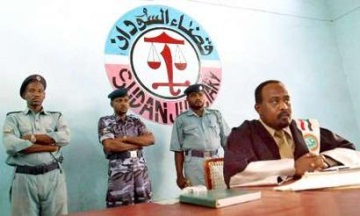Sudan’s deputy chief justice says judges may be trained to carry out amputations
March 11, 2013 (KHARTOUM) – Sudanese judges may receive special training on performing amputation on convicts should doctors refuse to carry them out, the country’s deputy chief judge said Monday.

After several years of appeal which reached the constitutional court, the ruling against al-Muthna was upheld.
The sentence drew strong rebuke and condemnation from several human right groups inside Sudan and abroad, as well as the governments of Canada and France.
Speaking at a press briefing on Monday, Sudanese deputy chief justice Abdul Rahman Sharfi defended the sentence, emphasising that it is part of Islamic Shari’a law.
Sharfi disclosed that more than 16 cases involving similar punishments had been carried out since 2001 and underscored that they have no shame in the implementation Shari’a law.
“We cherish the book of Allah [Quran] and not the Hippocratic Oath [required by doctors]”, the deputy chief justice said.
Sharfi warned that doctors who refuse to carry out court-ordered amputations – which he described as “the rule of Allah” – will be prosecuted and that judges could be trained on the process if needed.
“If doctors refuse to carry out Hudud [Islamic] penalties then we are prepared to train and qualify some judges on the medical process of how to do the amputations”, Sharfi said.
He affirmed the independence of the Sudanese judiciary and denied it had fallen under the influence of external parties that may attempt to intervene in court rulings.
The judicial figure gave an example of his decision to hand down 36 death sentences against members of the military who committed crimes, including one last February involving four members of the Sudan Armed Forces (SAF) and People’s Defence Forces (PDF).
“The executive authorities thought that this ruling would negatively impact the morale of the Mujahedeen [holy fighters], but we in the judiciary believe that any person who commits an offence should receive the right punishment”, Sharfi said.
He said that following the corroboration of the death sentence by the Constitutional Court, a military officer filed a motion claiming the emergence of new evidence in the form of a ministerial decision declaring the western region as a military operations zone, deeming re-trials necessary for the four indicted fighters.
“Although the memorandum concurred with the condemnation it opposed the penalty. At the same time the Constitutional Court rejected a petition filed by the defence to halt the implementation of the death penalty. In its decision the Constitutional Court said that the petition is nothing but tampering with the law and, hence, rejected the request to halt execution of the penalty. The case was sent back to the head of the judiciary”, he recounted.
“I ruled that the case has exhausted all stages of litigation and punishment must be enforced without accepting further requests for suspending execution”, Sharfi said.
Sharfi also asserted the jurisdiction of the Supreme Court to examine decrees issued by the president to check for their legality but not their appropriateness.
He also stressed that any person who is brought before the judiciary for charges of embezzling public funds is subject to the law and shall be tried without courtesy and according to the standards of justice.
‘SOUTH SUDANESE PRESENCE CONTRIBUTING TO CRIME RATE’
Sharfi also expressed concern about the implementation of the “Four Freedoms” agreement with South Sudan, noting that the Southern presence in the north after the 2005 Comprehensive Peace Agreement (CPA) had a significant impact on the level of crimes related to adultery and alcohol consumption.
He said that court rulings on adultery at the Omdurman judicial division in 2005 amounted to 31 compared to 142 rulings in 2009.
This he attributed to the influx of the Sudan People’s Liberation Movement (SPLM) supporters and southerners who arrived in the north in the wake of the CPA.
The secession of mostly non-Muslim South Sudan in mid-July 2011 sparked predictions that Sudan, which hosted former al-Qaeda leader Osama bin Laden in the 1990s, would start implementing Islamic law more strictly.
The Sudanese president, Omer Hassan al-Bashir, has said he wants to adopt a “100 percent” Islamic constitution now that the South has split off.
Most southerners have moved south since the birth of their country, but some 350,000 are estimated to remain in Khartoum.
Last year, the two countries signed the “Four Freedoms” agreement which grants its citizens the right of employment, residency, employment and movement in their territories.
However, its implementation has been placed on hold as Khartoum insisted on finalising security arrangements first.
(ST)
